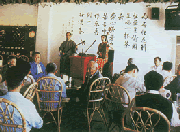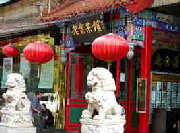Wild Teahouse
Beijingers were fond of going on excursions to the suburbs throughout the year. In the places they most frequented, wild teahouses appeared. This kind of teahouses was almost always located in the suburbs bestowed with beautiful scenery, serving as a venue for both play and rest. The tables and chairs were usually very simple, with commonplace tea being sold instead of "Long Jing" or "Mao Jian." The enjoyable part about wild teahouses was the intoxicating countryside scene and flavor.
Wine Teahouse and Others
Wine teahouses, which, as the name indicates, sold tea and wine at the same time, were usually on a small scale, just providing a place for people to have a talk.
 There were also chess teahouses, which were good places for play chess while enjoying tea. At any rate, people from all walks of life could find the proper teahouse for themselves. As a book once pointed out, the teahouses in fact had transformed from an entertainment venue for the rich people to a shelter from the reality for the perplexed and poverty-stricken people. For the most loyal of regular teahouse customers, enjoying each other's company in a relaxing atmosphere counted more than anything else.
There were also chess teahouses, which were good places for play chess while enjoying tea. At any rate, people from all walks of life could find the proper teahouse for themselves. As a book once pointed out, the teahouses in fact had transformed from an entertainment venue for the rich people to a shelter from the reality for the perplexed and poverty-stricken people. For the most loyal of regular teahouse customers, enjoying each other's company in a relaxing atmosphere counted more than anything else.
In the 1930s, the outdoor teahouses in Zhongshan Park becamewent extremely famous, gradually replacing the traditional indoor teahouses. Beijingers were allowed to enjoy their tea in the park, which used to be limited to the royal members.
Nevertheless, after the founding of the Republic of China in 1911, the teahouses in Beijing as a whole began to go downhill, due to the whole country suffering from a great economic depression and social turmoil. Under such circumstances, it was hard to maintain the teahouses, which were operated with a small capital and little profit. By the time of the founding of the People's Republic of China in 1949, there were only several teahouses left in Beijing.
 Famous Teahouses in modern Beijing
Famous Teahouses in modern Beijing
Savoring tea is an absolute enjoyment. In recent years,teahouses have sprung up in Beijing and have attracted an increasing number of customers with their exquisite tea wares, pleasant surroundings, and fabulous tea ceremony shows. While indulging in the joy brought on by the color, fragrance, and taste of tea, one may also feel submersed in the traditions of Chinese tea culture.
Lao She Teahouse
 Established in 1988, the Lao She Teahouse is named after the famous Chinese author, Lao She, and is a traditional teahouse that is characteristically old Beijing. Located at Qianmen West Street, where many time-honored shops and restaurants stand, it is endowed with a touch of antiquity. When one enters the teahouse, couplets of traditional Chinese paintings and calligraphy come into view. Palace lanterns are hung from the ceiling, and old-styled Baxian tables (square tables for eight people) can be found.
Established in 1988, the Lao She Teahouse is named after the famous Chinese author, Lao She, and is a traditional teahouse that is characteristically old Beijing. Located at Qianmen West Street, where many time-honored shops and restaurants stand, it is endowed with a touch of antiquity. When one enters the teahouse, couplets of traditional Chinese paintings and calligraphy come into view. Palace lanterns are hung from the ceiling, and old-styled Baxian tables (square tables for eight people) can be found.
At Lao She Teahouse, not only can the customers enjoy top quality tea, but also can have a taste of the local flavor of old Beijing, experiencing one of the pastimes enjoyed by old Beijingers. Traditional snacks served at Lao She Teahouse include: sweet biscuits, sweet dough twists, crispy fried noodles, sweet ears, sugared glutinous rice cakes, and other delicious treats. There are altogether over 20 different types of snack for people to savor and enjoy. The teahouse also offers a variety of performances such as tea ceremonies, Beijing opera,acrobatics, and magic shows.
Wufu Teahouse
The Wufu (Five Happiness) Teahouse is the largest teashop in nowadays Beijing. Since its establishment in 1994, it has opened 12 chain stores, with every store having a tranquil setting, the aroma of tea, and the melodious music being played on traditional stringed and woodwind instruments, all of which charms anyone walking through the doors.
At Wufu, customers can taste various famous teas from around China. The tea is usually infused with purified water in purple-sand teapots, a kind of teapot unique to China. While savoring tea, customers can also enjoy tea ceremony performances and the making of purple-sand teapots.
Wufu's chain stores are situated in different areas around Beijing, including Fuwai Street in the Xicheng District, Xueyuan South Road in the Haidian District, and Jianguomennei Street in the Dongcheng District. Opening hours are between 12:00 at noon to 2:00a.m.
MingrenTeahouse
The Mingren Teahouse, set up in 1997, has opened seven chain stores in Yuetan, Guanyuan, Chongwenmen, Hepingli, and other places in Beijing. The teahouse features quiet and elegant surroundings composed of miniature ponds and bridges, birds, fish, chessboards, paintings, and traditional Chinese stringed and woodwind instruments. Away from the hustle and bustle of the world, Mingren provides a locale for family gatherings, friendly chats, and business talks.
Author: Jessie
